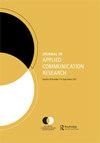‘But I don’t know if I want to talk to you’: strategies to foster conversational receptiveness across the United States’ political divide
IF 1.7
2区 文学
Q2 COMMUNICATION
引用次数: 1
Abstract
ABSTRACT This study explores the conversational receptiveness strategies that are intentionally embedded in the Braver Angels organization’s Red/Blue Workshops. These workshops facilitate difficult conversations across the political divide in the United States, especially communication between Republicans and Democrats. Workshop training materials and workshop recordings were analyzed to identify how moderators were trained to encourage conversational receptiveness through structured dialogue. Results identified trained facilitator strategies (greeting behaviors, acknowledging power differences, setting up structures for safety of outgroup conversations, active listening, and showing appreciation for participant input), structured conversational receptiveness practices (limiting assumptions through perspective-taking and locating shared interests), and the strategic sequencing of training activities all contributed to creating dialogic moments. The conversational work done in these workshops around sharing one’s own perspective and invoking the perspectives of others, holds potential implications for helping to create communities of dialogue where people can develop conversational receptiveness, both within these workshops and beyond.“但我不知道我是否想和你说话”:在美国的政治分歧中,提高对话接受度的策略
本研究探讨了在勇敢天使组织的红/蓝工作坊中有意嵌入的会话接受策略。这些研讨会促进了跨越美国政治分歧的艰难对话,特别是共和党和民主党之间的沟通。对讲习班培训材料和讲习班录音进行了分析,以确定如何训练主持人通过结构化对话来鼓励对话接受性。结果确定了训练有素的引导者策略(问候行为,承认权力差异,建立外部群体对话的安全结构,积极倾听,并对参与者的投入表示赞赏),结构化的会话接受实践(通过换位思考和定位共同利益来限制假设),以及培训活动的战略顺序,这些都有助于创造对话时刻。在这些研讨会上进行的对话工作围绕着分享自己的观点和援引他人的观点,这对帮助创建对话社区具有潜在的意义,人们可以在这些研讨会内外发展对话接受能力。
本文章由计算机程序翻译,如有差异,请以英文原文为准。
求助全文
约1分钟内获得全文
求助全文
来源期刊

Journal of Applied Communication Research
COMMUNICATION-
CiteScore
4.00
自引率
8.70%
发文量
52
期刊介绍:
The Journal of Applied Communication Research publishes original scholarship that addresses or challenges the relation between theory and practice in understanding communication in applied contexts. All theoretical and methodological approaches are welcome, as are all contextual areas. Original research studies should apply existing theory and research to practical solutions, problems, and practices should illuminate how embodied activities inform and reform existing theory or should contribute to theory development. Research articles should offer critical summaries of theory or research and demonstrate ways in which the critique can be used to explain, improve or understand communication practices or process in a specific context.
 求助内容:
求助内容: 应助结果提醒方式:
应助结果提醒方式:


